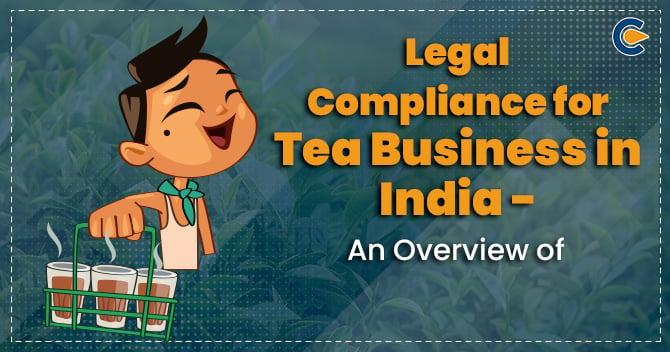Via Section 4 of the Tea Act, 1953, the Indian Government set up a regulatory agency named Tea Board of India which aims to encourage the domestic trade, cultivation processing & cultivation of tea in India and, most highly facilitating FSSAI License for Tea. The FSSAI has released some guidelines specifying the rules & regulations that Tea Businesses in India need to follow. The Licensing branch of the Tea Board of India is accountable for implementing various legal and regulatory orders granted by the Government along with guiding the tea industry concerning different financial policies & legislation and issuing various licenses. If anyone wants to start a Tea Business in India, then it is necessary to know the legal compliance for Tea Business in India. Scroll down to check the legal compliance for Tea Business in India.
Regulatory Authorities in India for Tea Business
The tea business, under the Act of Parliament, is under the control of the Union Government. A number of authorities have been established to regulate the Tea Business in India. Some of the authorities or agencies are listed below:
- FSSAI;
- Tea Board of India;
- Tea (Distribution & Export) Control Order, 2005;
- Tea Warehouse (Licensing) Order, 1989;
- Tea (Marketing) Control Order, 2003;
- Tea Waste (Control) Order, 1959;
- Tea Act, 1953.
What Licenses Are Required for Opening a Tea Business in India?
Following are vital licenses required for opening a Tea Business in India:
- Business License;
- Exporter’s License;
- Tea Waste License;
- Distribution License;
- Tea Warehouse License;
FSSAI Guidelines for Food License for Tea Business
The FSSAI has issued guidelines regarding the sale of flavoured and Kangra Tea, the labelling for tea products, the testing & approval of products, and the composition of tea.
- The product shall have the feature flavour free from any mustiness, taint, and off-odour. It must not include dead insects, insect fragments, living insects, and rodent contamination that is visible to the naked eye. The product shall be free from harmful substances, added colouring & inessential matter.
- Tea used in the production of the flavoured tea shall confirm to the standards of tea. Also, the tea containing added flavour requires to bear a proper label declaration as given in the regulation. If the manufacturer is providing flavoured tea, then they should register with the Tea Board before marketing flavoured tea.
- The tea may comprise natural flavours and natural flavouring substances, which are flavour preparations & acceptable for human consumption only if it is attained by physical processes from the plant origin, either in their original state/after processing for human consumption in packaged tea only.
- The manufacturers must ensure that the tea is packed & labelled as per FSSAI Regulations, whose labelling requirements are extremely severe. If the requirements are not fulfilled completely, the manufacturer will be responsible for penalties cited under the FSS (Packaging & Labelling) Regulation, 2011.
- The label must bear all the vital information before it is ready for sale in the market in a clear, prominent & easily readable format for the customers. The product must be labelled with the following information:
- The common name of the product;
- Expiration date & best before date;
- Ingredients details with additives;
- Country of origin for imported food;
- Name & address of the manufacturer;
- Batch number or packaging codes;
- Manufacturing date;
- Net weight of the content by weight, volume, or count.
Some Basic Legal Compliance for Tea Business
Following are some basic legal compliance for Tea Business in India:
- A tea plantation should register with the Labour Bureau of the State Government within sixty days of its start date under the Plantation Labour Act, 1951;
- Under the Tea Act, 1953 and Tea Rules, the Licensing Branch permits for replacement & extension of the planting of tea to existing tea estates;
- No distributor or exporter of tea may conduct business without a business license issued by the Tea (Distribution & Export) Control Order, 2005. Unless suspended/cancelled, a business license is valid for 3 years from the date of issuing;
- The Licensing Branch also grants newcomers permission to grow tea as well as records any changes in ownership of the tea plantation;
- The ownership of a tea factory or any alteration in ownership must be incorporated with the Tea Board of India under the TMCO, 2003[1].
Conclusion
The tea business in India is one of the oldest & largest in the world, with around 31% of global production. The tea business has always enjoyed the Government’s support due to its status as a mass employer. However, to start a Tea Business in India, it is necessary to acquire all vital licenses, fulfil requirements, and legal compliance for Tea Business as mentioned above.











